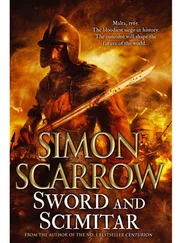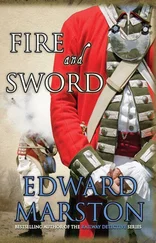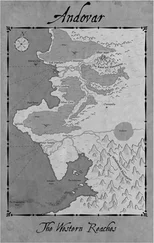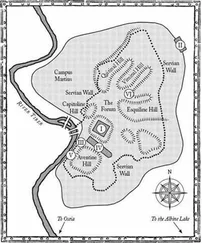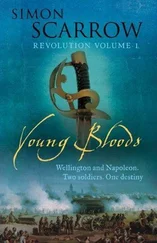The wind suddenly howled round the signal station tower for a moment, threatening to dislodge Napoleon’s hat, and his hand flew up to hold the brim firmly until the gust had passed. He waited a moment to be sure, then raised his telescope and rested it on the edge of the wall that ran round the top of the tower. He slowly tracked across the choppy white-capped waves out over the sea until he found what he was looking for.
A British frigate was cruising along the coast in a languid fashion, under topsails in the strong breeze. A handful of tiny figures could be seen climbing the rigging to make adjustments to the trim of the canvas that bloomed from the highest spars. Napoleon watched the warship for a moment, as it gracefully went about and put in a tack away from the coast.The same ship had been patrolling the approaches to the harbour for months, in an unceasing routine that varied only minutely according to weather conditions. Napoleon shifted the direction of the telescope towards the horizon and after a short search found the neatly spaced line of white topsails of the rest of the blockading squadron.At least ten ships of the line stood watch over the French port, great towering slabs of oak pierced by two or three lines of gun ports. Between them those ships carried twice as many cannon as the army surrounding Napoleon, and of greater weight too. As the situation stood, if the invasion fleet attempted to cross the Channel in the face of the British navy it would be blown to pieces long before it reached the English coast.
The situation was about to change, Napoleon reflected with satisfaction as he straightened up and closed his telescope with a snap. For months now the scattered squadrons of the French navy had been breaking out of their ports and heading across the Atlantic to a secret rendezvous off the coast of Martinique. If all went according to plan, AdmiralVilleneuve would wait until he had forty ships of the line under his command. Then he would recross the ocean and fall upon the English Channel fleet with overwhelming force, and crush the enemy. Even if he failed to defeat them,Villeneuve would be able to clear the Channel for long enough to cover the invasion fleet.
Napoleon turned to his chief of staff. ‘Still no word then, Berthier?’
‘No, sire. Nothing in the morning despatches.’
‘No signals from Paris? Nothing relayed from the watch station at Ushant?’
‘I’m afraid not, sire.’
Admiral Villeneuve and his fleet were overdue. Napoleon turned to gaze out over the sprawl of shelters and tents of his army and slapped his thigh in frustration. A month earlier he had secretly quit Italy and travelled across France to be with the army by the time the French fleet appeared in the Channel. After his spectacular coronation in Milan he and his court had toured the great cities of northern Italy, moving from one civic reception to another, surrounded by cheering crowds who were delighted to be free of the iron fist of the Austrian empire. But all the time, Napoleon was thinking of his plans for the invasion of Britain. With luck, the enemy would think that he was still in Italy even as the army was boarding the transports, ready to cross the narrow channel under the protection of Admiral Villeneuve’s fleet.
But luck, it seemed, was against him, Napoleon mused. That timid fool Villeneuve had failed to carry out his orders so far. The admiral had been present at the Battle of the Nile when Nelson’s warships had annihilated the French fleet. Ever since thenVilleneuve had been in awe of the British navy. On several occasions in the past year Napoleon had been driven to frustration and rage by the admiral’s failure to put to sea, even when wind and numbers were on his side. It was only by directly threatening to dismiss Villeneuve that he had finally got his way. Napoleon pressed his lips together. Most of the navy’s senior officers had been purged during the revolution, and the weak-minded Villeneuve was one of the few that remained. Otherwise he would have been removed from his post long ago.
‘Well then,’ Napoleon rounded on Berthier, ‘I’m returning to headquarters for the rest of the morning. Are the preparations for this afternoon’s review complete?’
‘Admiral Bruix assures me that all will proceed as planned, weather permitting.’
‘Weather permitting?’ Napoleon glanced out to sea. ‘Surely the admiral is not afraid of a few waves?’
Berthier shrugged.‘He says that there may be a gale brewing up, sire, in which case it would be dangerous for the transports and gunboats to put to sea.’
The anticipation and tension of waiting for Villeneuve to arrive had added to Napoleon’s exhaustion after the journey from Milan, and he snapped back irritably to his chief of staff. ‘The review will take place. I order it. I will not let a little breeze make a coward of the admiral.You tell him that!’
‘A little breeze?’ Berthier glanced out to sea where long grey rollers were sweeping in from the ocean. He bit his lip, and when he turned back and saw the dark expression on the Emperor’s face he swallowed nervously. ‘Yes, sire. I will tell him at once.’
The wind continued to grow in strength during the rest of the morning and by noon there was a gale blowing in over the coast, moaning as it whipped across the tiles of the inn that served as the imperial headquarters. Napoleon sat at a large table strewn with maps marking the positions of the invasion army and the routes they would take once they landed in Britain. But his mind was not on the details before him. He was deep in thought over the latest news he had received from Paris.
Talleyrand’s report told of the continuing preparations for war by Austria and Russia.The Tsar had apparently vowed to put an end to the ‘monstrous regime of revolutionary France’. There was some good news, however. Talleyrand had managed to buy Prussian neutrality by offering them Hanover. King Frederick William was only too pleased at having won a new land without having had to fight a war. Napoleon smiled to himself. Clearly the man had no scruples, and, more importantly, no courage. Indeed, the main threat to French interests at the Prussian court was not the King but his wife, Louise, who hated France with all her passion.
‘The only real man in the whole of Prussia,’ Napoleon mused.
Berthier looked up from the end of the table where he was copying Napoleon’s orders in a fair hand for distribution to the small staff of secretaries. ‘Sire?’
‘It was nothing.’ Napoleon flicked his hand dismissively, glanced at the clock against the wall and then stood up abruptly. ‘Is Admiral Bruix ready?’
Berthier shrugged. ‘He has not sent word yet, sire.’
‘Then find him and bring him to me at once. I want the review to commence within the hour. I will brook no further delay. Tell him.’
Berthier nodded, scribbled down the order and left the room in search of an orderly to carry the message to the admiral. Napoleon crossed to the window and looked out at the harbour. Down on the quay stood the men of the division waiting to be rowed out to their vessels. He had ordered Bruix to demonstrate the landing procedure with thirty barges. Once the men were aboard, the flotilla would pass along the shore while Napoleon and his staff watched their progress from a specially erected pavilion. After that the men would demonstrate a landing on the shore. It would be a useful experience for all concerned and Napoleon was looking forward to analysing the procedures to see if he could suggest any improvements.That would put Bruix and the other naval officers in their place, he reflected, and give his subordinates one more example of their Emperor’s omniscience.
A sudden patter of rain against the glass drew Napoleon’s attention back to the weather. Overhead a thick band of cloud had blotted out the last patch of blue sky and a fresh gust of wind hurled the rain against the window with a sharp rattle.A moment later the view of the harbour had dissolved in the blur of water running down the window panes.
Читать дальше


